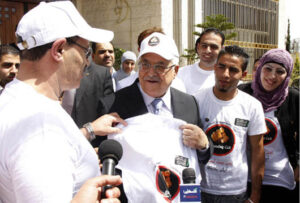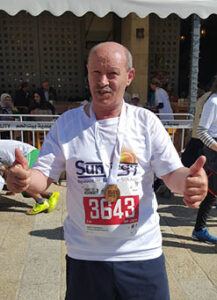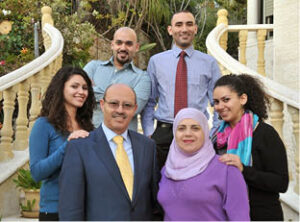Born in 1954 in Arraba-Jenin, Hasan Abu-Libdeh grew up with a passion for mathematics, which he majored in at Birzeit University where he was active in the students’ movement. During his undergraduate studies, he spent time in prison as a political activist. After graduating in 1979, he pursued his postgraduate studies at Stanford University in the United States, earning a master’s degree in mathematical statistics in 1981. Upon his return, he became a lecturer in mathematics at Birzeit University. A few months later, he was placed under town arrest for 18 months in Jenin, along with 30 other community leaders and members of the “National Steering Committee.” The international mathematical society launched an international campaign to free him, and in 1983, he was declared a prisoner of conscience by Newsweek, in its edition of February 14, 1983.
Later that year, he was exiled for a period of five years, during which he earned another master’s degree in applied statistics in 1986 and a PhD from Cornell University in biostatistics in 1988. Dr. Abu-Libdeh went back to Palestine and worked as an assistant professor for three years at Birzeit University.
In 1991, he cofounded the Palestinian Technical Committees at Orient House in Jerusalem and acted as its deputy chairman. These committees were charged by the PLO to prepare technical material for the bilateral and multilateral negotiations, as well as for the preparations to establish various Palestinian Authority institutions. That year, he joined the Palestinian Negotiating Team in Madrid and Washington, DC, and then was sent to the Oslo negotiations.
During this period, he founded the Palestinian Central Bureau of Statistics, PCBS, with a mandate to collect information that would help develop the Palestinian nation. He also co-founded PECDAR (the Palestinian Economic Council for Development and Reconstruction) and managed it until July 1994. In 1997, PCBS conducted its first census that measured demography, employment, health, education level, medical disabilities, and other statistical information that later served as the stepping-stone for the Palestinian government.
Since 2003, Dr. Abu-Libdeh has assumed several public positions, including cabinet secretary, bureau chief of Prime Minister Ahmad Qurei’s office, and minister of labor and social affairs. He then moved to the private sector, where he worked as the chairman and CEO of the Palestine Stock Exchange.
In 2008, he was assigned to plan and run the Palestine Investment Conference, PIC, as its CEO. The PIC has managed to attract more than 2,000 participants from around the globe and witnessed closing projects that total US$1.4 billion for the Palestinian economy.
Between 2009 and 2012, Dr. Abu-Libdeh assumed the position of cabinet secretary and later was minister of national economy. During his tenure, he launched a national campaign to boycott the economy of Israeli settlements and played an instrumental role in drafting the Palestinian law against Israeli settlements. Aside from all of the above, it is worth mentioning that Dr. Abu-Libdeh is a member of the Palestine Union of Writers, being a poet and short-story writer.
In 2012, Dr. Abu-Libdeh discovered his new passion for renewable energy and established Sunergy for Renewable Energy Solutions, a company dedicated to providing alternative sources of energy that are cheaper and less harmful to the environment, and later he co-founded the Federation of Renewable Energy Industries.
Dr. Abu-Libdeh is married and has two sons and two daughters.




